|
|
|
Sort Order |
|
|
|
Items / Page
|
|
|
|
|
|
|
| Srl | Item |
| 1 |
ID:
171047
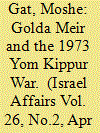

|
|
|
|
|
| Summary/Abstract |
Most historians blame Israeli Prime Minister Golda Meir for the outbreak of the 1973 Yom Kippur War, having allegedly rejected all peace proposals made by Egyptian President Anwar Sadat. In fact, Sadat was adamantly opposed to Meir’s demand for direct negotiations, envisaging political settlement as an American dictate on Israel. The Yom Kippur War shook both sides of their intransigence and brought them closer to each other’s position.
|
|
|
|
|
|
|
|
|
|
|
|
|
|
|
|
| 2 |
ID:
158148
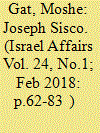

|
|
|
|
|
| Summary/Abstract |
Between 1969 and 1971 US diplomat Joseph Sisco was the driving force behind all initial steps to resolve the Israeli‒Egyptian conflict. But despite his tremendous efforts, his ability was limited as President Nixon did not throw his weight behind these efforts. Three main initiatives were taken during the discussed period: the Rogers Plan, the Rogers Initiative, and Sadat’s initiative for an interim agreement. Most of Sisco’s efforts concentrated on the latter initiative. His failure to reach an interim agreement, coupled with his inability to persuade Israel and Egypt to accept the Rogers Plan, led the region to political stagnation, from which the two parties only emerged in the aftermath of 1973 Yom Kippur War.
|
|
|
|
|
|
|
|
|
|
|
|
|
|
|
|
| 3 |
ID:
119859
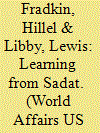

|
|
|
| 4 |
ID:
143620


|
|
|
|
|
| Summary/Abstract |
Between 1967 and 1973, Israeli governments took no initiative to set a peace process in motion. Instead, they simply responded to proposals that were raised from time to time, and, for the most part, rejected all of them – the Rogers Plan, Sadat’s willingness to sign a peace agreement and his initiative for an interim settlement – with the sole exception being the ceasefire agreement reached in August 1970. While Israeli policy lacked initiative on the political front, it dedicated much effort to convincing the United States that the greater Israel’s military power, the better its deterrence capabilities would be, which in turn would increase the likelihood of achieving peace. Hence, Israeli leaders’ repeated requests to be supplied with advanced aircraft.
|
|
|
|
|
|
|
|
|
|
|
|
|
|
|
|
| 5 |
ID:
189417


|
|
|
|
|
| Summary/Abstract |
In the wake of the October 1973 war, Moscow sought superpower collaboration that would ensure its participation in the nascent Arab-Israel peace process, but the direct Israeli-Egyptian negotiations that culminated in the September 1978 Camp David Accords foiled this plan. As a result, the Soviets launched a diplomatic offensive against the deal and tried to forge an Arab front to isolate Egypt, only to see Cairo and Jerusalem signing a fully fledged peace treaty in March 1979. Then came the Iran–Iraq war (1980–88) and further shattered Moscow’s Middle Eastern stance as fears of Tehran’s hegemonic designs led to Egypt’s reincorporation into the Arab fold.
|
|
|
|
|
|
|
|
|
|
|
|
|
|
|
|
| 6 |
ID:
114262
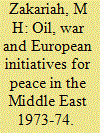

|
|
|
|
|
| Publication |
2012.
|
| Summary/Abstract |
The Arab-Israeli wars since 1948 resulted in several peace treaties between Israel and its neighbours brokered by the US, the Soviet Union and European countries in an attempt to achieve a just and lasting peace settlement in the Middle East. All efforts however proved ultimately futile, with the resumption of war several years after each peace treaty had been signed. For example, after the Six Day War of 1967, all parties agreed to accept a peace treaty based upon United Nations Resolution 242. However, six years after the tabling of the resolution, war broke out again on October 1973. Another long process of peace settlement ensued which culminated in the Camp David Accords, brokered by President Jimmy Carter. These peace accords, signed between President Anwar Sadat of Egypt and Menachem Begin of Israel on 17 September 1978, led directly to the Israel-Egypt Peace Treaty of 1979. Despite its success, the 1979 treaty yet again failed to achieve the just and lasting peace settlement that had been expected. In all these treaties, the core issues of the conflict, such as the Palestinian refugee problem and the status of East Jerusalem, failed to be resolved. This article examines the British attitude and perspective towards the peace settlement after the 1973 war, focussing on the proposal for an International Peace Guarantee and the initiative of the Euro-Arab Dialogue. Based upon declassified archival records of the Foreign and Commonwealth Office available at the National Archives in England, it unveils the attitude of the British government towards the UN Resolutions as well as its collective initiatives with the European Community to establish a just and lasting peace settlement in the Middle East.
|
|
|
|
|
|
|
|
|
|
|
|
|
|
|
|
| 7 |
ID:
111020
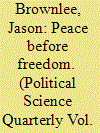

|
|
|
|
|
| Publication |
2011.
|
| Summary/Abstract |
Jason Brownlee assesses the foundations of the contemporary U.S.-Egyptian alliance, which was consolidated in 1979 by the Egyptian-Israeli Peace Treaty. He concludes that the bold diplomacy of Egyptian President Anwar Sadat was matched by fierce repression at home. Moreover, Egypt's foreign interlocutors presupposed that authoritarianism inside Egypt would help guarantee the country's new foreign policy alignment.
|
|
|
|
|
|
|
|
|
|
|
|
|
|
|
|
|
|
|
|
|